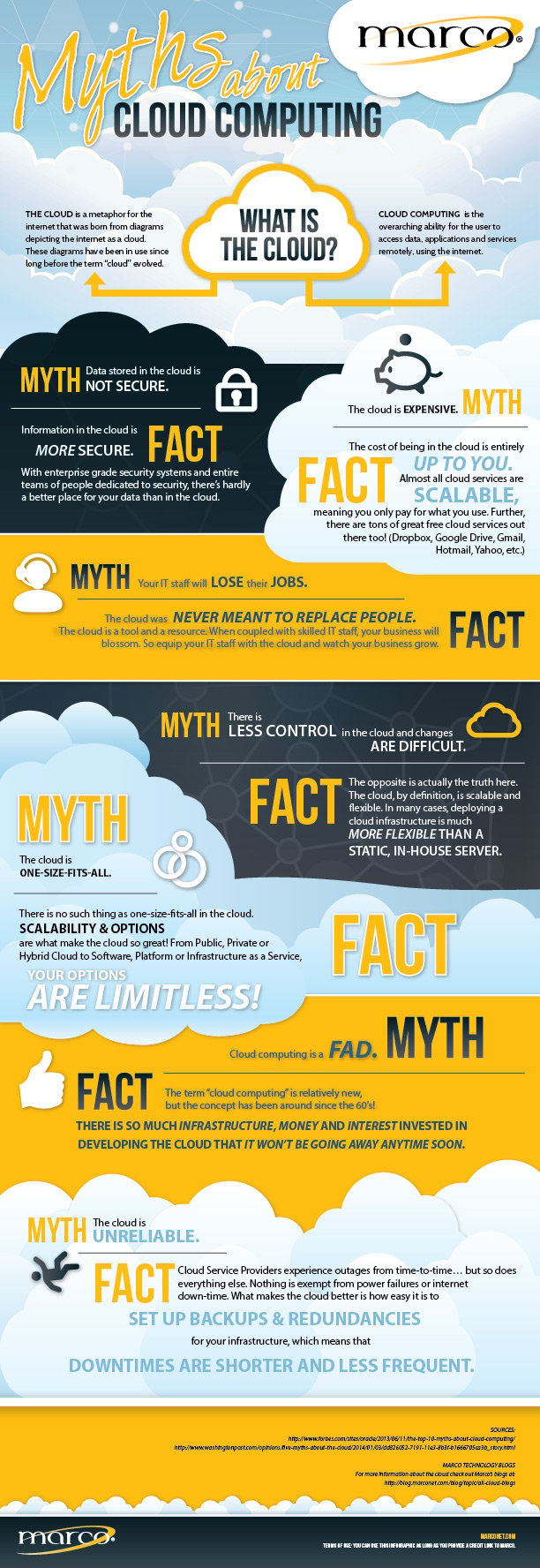There are many myths that exist related to cloud computing, in part due to the complexity and confusion that evolve around this technology. Our first infographic was designed to provide clarity through answering common questions about the cloud.
With this infographic we are aiming to disprove the myths preventing businesses from taking advantage of the cloud's abilities.
To view the full size infographic, click here. For a printable, high resolution view, click here.
Defining Cloud Computing
As you may already know, the term cloud computing refers to business applications, storage and other functions that make use of off-site servers, rather than a company having to purchase, house and maintain computer servers on-site. With cloud computing, document storage and computer applications are hosted off-site and connected to your office computers via the Internet. This can provide significant financial and time savings because your company no longer needs on-site servers and storage, nor do you need a team of experts to maintain these hardware and software systems.
Cloud computing is truly revolutionizing how small and mid-size businesses use computer technology. Applications and processes that were only affordable for large corporations a few short years ago are now within the means of virtually any business. You no longer need to maintain a capital budget for technology maintenance and improvements; you’ll now have more time and resources to put toward new projects that service your customers. Cloud computing is more cost effective, freeing up resources to grow your business, instead of spending valuable resources maintaining technology.
The bottom line is, all your company needs to have access to the latest network infrastructure and software applications is a cloud subscription. And, although many businesses understand these concepts, they also have reservations, many of which stem from generally believed myths about cloud computing.
To summarize, here are 7 main truths to remember about the cloud:
- Data stored in the cloud is secure.
If you are interested in more information about cloud security, read my blog, “How Valid are Cloud Computing Concerns?” - The cost of cloud services depends on your business' computing needs.
In the past, advanced technology was exclusive property of large corporations, because they were the only ones that could afford it. Check out this blog, “Level the Playing Field with Affordable Small Business Cloud Computing,” for more information about cloud computing costs. - The cloud is a tool and a resource that enhances the capabilities of your IT staff.
Cloud computing services, in addition to the technology itself, can also provide valuable assistance and support to your IT staff, specifically by addressing challenges that may arise. Read more about this support in our blog, “Minimize Cloud Computing Challenges with IT Service Management.” - Cloud infrastructure is flexible and scalable.
Flexibility and scalability are two of many benefits cloud computing offers businesses. To read about more, check out our blog, “How Would Your Business Change if You Moved to the Cloud?” - Your cloud computing options are limitless.
Begin researching your limitless options by starting with our blogs on SaaS, PaaS and IaaS: - Cloud computing is not a fad - it is here to stay.
Because cloud computing is a fairly new concept to many businesses, hence the belief that it is a fad, there are many questions that have been raised. In an effort to answer as many as possible, we wrote a blog series that addresses the most pressing. You can find those here: - The cloud has built in backups and redundancies for reliability; outages are less frequent and your downtimes will be shorter.
Removing on-premise hardware may seem like a step in the wrong direction, however, doing so will save you space and energy while giving you access to the latest and greatest technology and the expertise of your service providers.
Many resources exist to explain and define cloud computing, but at some point you may wish to talk to a Cloud Computing Specialist to have your specific needs and questions addressed. When that time comes, request a free consultation:


